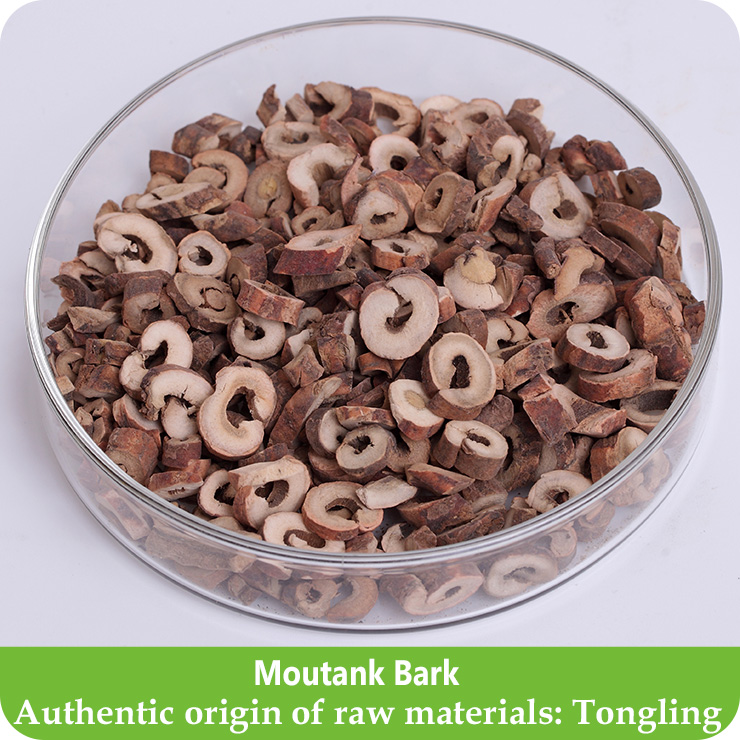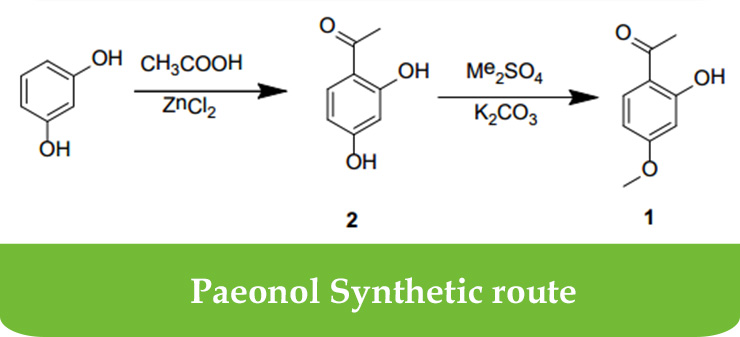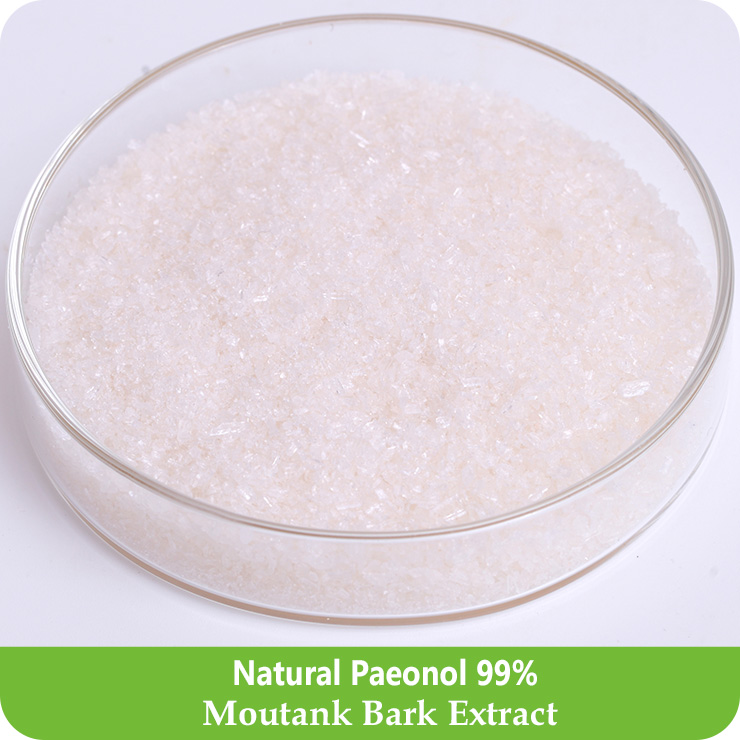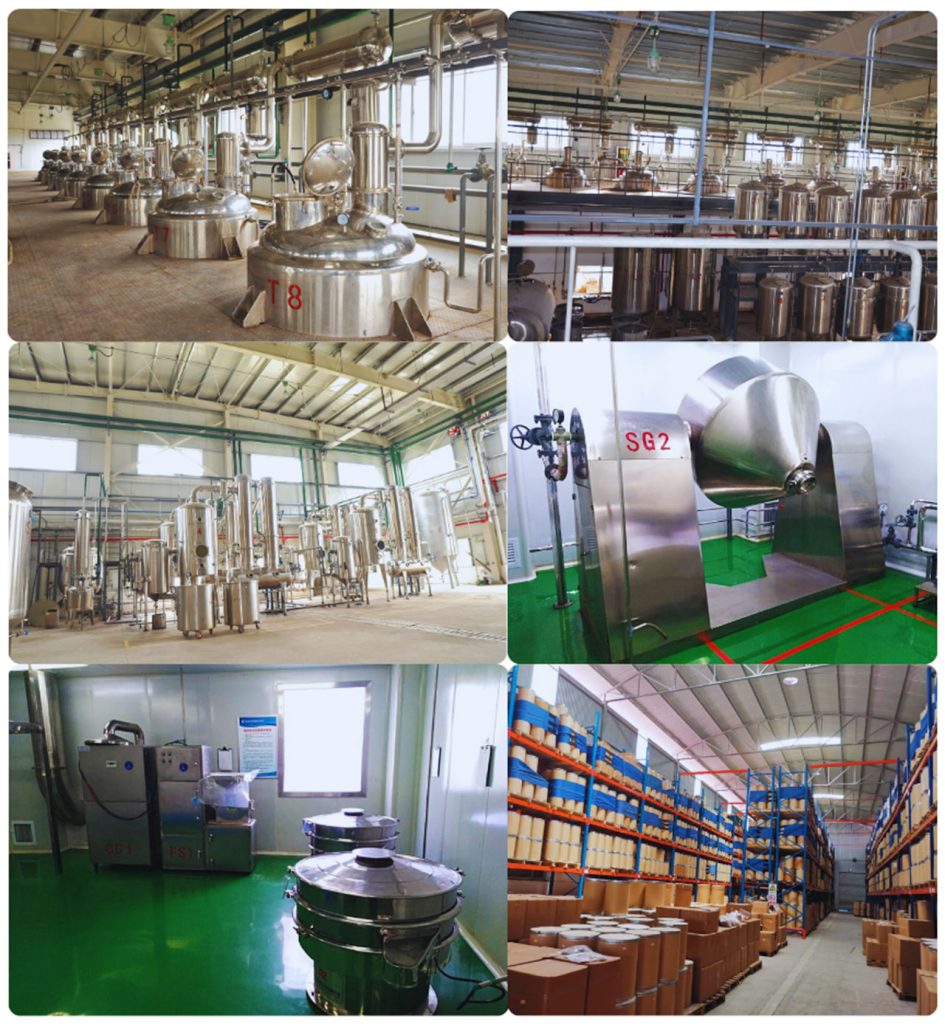Natural Paeonol (C9H10O3), with CAS number 552-41-0, is an organic compound known for its analgesic, anti-inflammatory, antipyretic, and antiallergic properties.
Natural sourcing:
Paeonol is primarily extracted from moutan bark and Cynanchum paniculatum with an average content ranging from 0.5% to 2.0%. Common extraction methods include organic solvent extraction, distillation, macroporous resin extraction, and supercritical fluid extraction, among which steam distillation is most widely used.

Synthetic sourcing:
Paeonol is synthesized through chemical methods. Common synthetic approaches include Friedel-Crafts acylation, Fries rearrangement, and montmorillonite-catalyzed microwave synthesis.

Paeonol Specification
| Items | Specification |
| Appearance | White crystals powder |
| Odor | Characteristic |
| Taste | Characteristic |
| Loss on Drying | ≤1.0% |
| Residue on Ignition | ≤0.1% |
| Melting point | 49-51℃ |
| Extract Solvent | Water |
| Heavy Metal | ≤20ppm |
| As | ≤2ppm |
| Residual Solvents | Eur.Pharm.2000 |
| Total Plate Count | ≤1000cfu/g |
| Yeast & Mold | ≤100cfu/g |
| E.Coli | Negative |
| Salmonella | Negative |
| Assay paeonol | ≥99.0% |

Differences between Natural and Synthetic Paeonol:
Source and Preparation:
- Natural Paeonol is extracted from moutan bark and Cynanchum paniculatum
- Synthetic Paeonol is prepared through chemical synthesis methods, typically starting from phenol or other chemical raw materials and undergoing a series of reactions.
Chemical Composition and Purity:
- Natural Paeonol usually contains other bioactive compounds.
- Synthetic Paeonol is a single compound.
Applications and Effects:
- Natural Paeonol is widely used in various industries such as food, leather, textile, and pharmaceuticals, serving as preservatives, dyes, tanning agents, and medicines.
- Synthetic Paeonol, due to its higher purity and controllability, may have advantages in certain industrial applications, but there may be usage restrictions or regulatory requirements in fields such as food, pharmaceuticals, and cosmetics.
Common Application Areas:
- Personal care and cosmetics products, such as toothpaste
- Health supplements and pharma products: such as Liu Wei Di Huang Wan also known as Liuwei Dihuang tea pills or Six Flavor Rehmanni
- Topical ointments such as Paeonol Ointment.
Prospects:
Paeonol as an organic compound with broad application prospects, has a promising market outlook. It holds significant development potential in the pharmaceuticals, cosmetics, and food industries. Strengthening scientific research, improving product quality, expanding market channels, and enhancing brand building can better exploit the market potential of Paeonol, thereby promoting its prosperous development.
Our Advantages:
Our products can provide certifications such as HALAL, HACCP, and KOSHER. The company is ISO-certified, and product production strictly adheres to GMP standards for quality control and stability.
We offer professional and economical shipment ways, including express, air, and sea freight, ensuring safe and prompt delivery to customers.
We have a professional business team that quickly understands your requirements for the correct product specifications through communication and provides technical support.
We have 20 years of experience in overseas sales, our products are sold in Southeast Asia, North America, Europe, the Middle East, and other regions.


